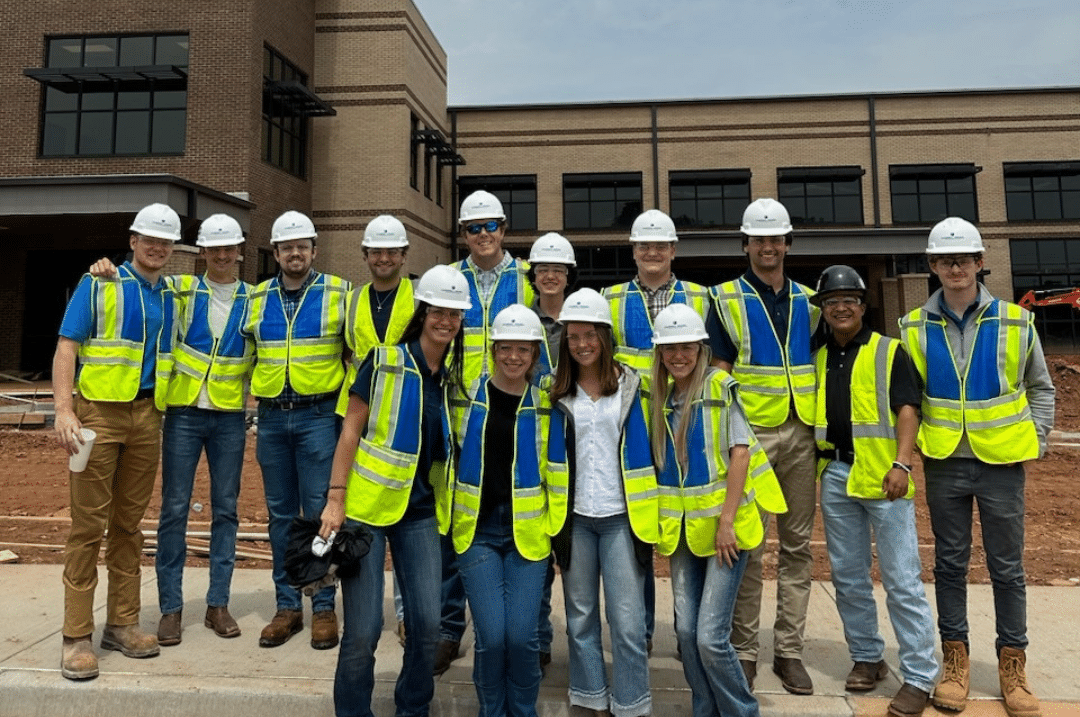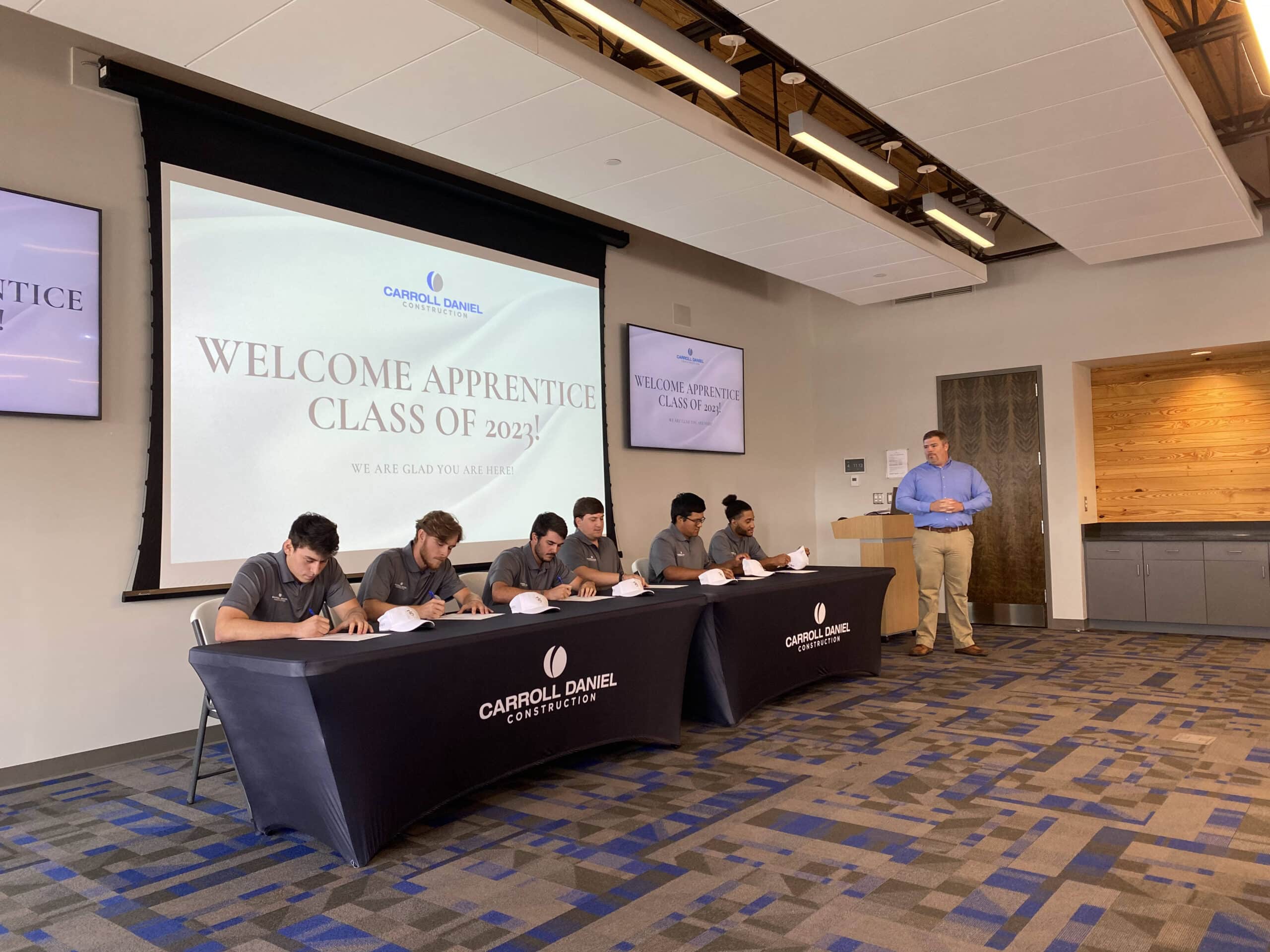If people are the most valuable resource at a company, as the saying goes, then it holds true that the workforce is the most important investment companies can make. Future success relies on having skilled talent, which is why career and technical education (CTE), the nationwide training focus for February, are essential to workforce development.
Recruiting, training, and retaining workers is especially critical in a challenging labor market. The U.S. construction industry still had nearly 400,000 unfilled positions at the end of 2023, according to analysis by the Associated General Contractors of America (AGCA), with year-over-year construction employment declining in 80 metro areas.
“The best way to address construction workforce solutions over the long-term is to boost investments in construction education and training programs,” said AGCA CEO Stephen E. Sandherr.
Through apprenticeships, college internships and work-based learning, Carroll Daniel Construction Company (CDCC) puts that core belief into action to the benefit of its people, partners and the industry as a whole.
Investing in Training Programs
Vital to the construction industry, technical training provides an individual with the knowledge and skills needed to perform essential tasks, from learning how to operate a piece of equipment to using project management estimating software or reading a set of plans. As a ‘safety first’ industry, training also helps protect that most valuable resource, teaching personnel to identify potential hazards, understand safety protocols and effectively respond to emergencies.
The goal of training is to develop people to the best of their abilities, both professionally and personally. The belief here is that there is no one best way to approach training in construction, but it’s important to have a good mix of on-the-job training and classroom time, which Carroll Daniel accomplishes through their programs:
APPRENTICESHIP PROGRAM
CDCC’s apprenticeship at Lanier Technical College, which is structured at around a 3 to 1 ratio of on-the-job training to classroom instruction, is designed to fast-track students to becoming a construction superintendent. The two-year, no-cost program is available to high school and trade school students, as well as all existing or prospective employees. Upon successful completion, the apprentice may be eligible to continue his or her career at CDCC as a field engineer.
INTERNSHIP PROGRAM
CDCC’s internship program caters to sophomore to senior college students enrolled in a 4-year construction management program or related field. Interns are immersed in every aspect of the preconstruction and construction processes, and also undergo leadership training. The goal is to achieve a holistic view of construction, so interns are equipped to decide which facet of the business suits them best and what career path they want to pursue further.
TRAINING ACADEMY
CDCC’s Training Academy, the company’s internal program, currently offers more than 50 in-person courses, in addition to more than 100 online ones. With three tiers of leadership training programs, there’s a class for everyone. Each course offers a good mix of technical and behavioral training to help create a well-rounded, customer-focused team member.
Starting Early = Starting Strong
The key is to introduce middle and high school students early to learning about the industry and then bring them on board through work-based learning before eventually enrolling them into the internship or apprenticeship program. CDCC’s apprenticeship has evolved over the past few years to where students are starting the program while they’re still in high school. Upon graduation, they are over halfway through their apprenticeship while many of their peers are just getting started.
Recruiting students and young adults can help boost diversity, adaptability and long-term loyalty, while helping with succession planning. However, the critical aim is not without its challenges – especially in a world where technology and computer screens are at the forefront, and the value of hands-on learning is often overlooked. It requires construction firms to think outside of the box for ways to promote the industry and foster interest.
“One of the keys to recruiting the next generation is reimagining the strategy and focusing on enhanced engagement,” says Angie Kennedy, marketing director at Carroll Daniel. “A career in construction is a proven alternative career path that leads to high paying and high demand jobs, often times with little to no student debt.”
CDCC has seen the benefits of introducing skilled trades at an early age. Increased engagement can be achieved through hosting Skills Challenges, workforce learning programs, and employing high schoolers, so they can work in both the office and the field, where they get to see and engage with actual projects and issues.
“Our goal is to introduce and engage young adults early, so they can make informed decisions about their career path when the time comes to start applying for jobs,” Kennedy continues.
When it comes to introducing young people to the construction industry and recruiting new talent, it’s important to get creative. From leveraging social media to hosting events, there are numerous ways to engage potential recruits. For instance, CDCC actively participates in the AGC’s regional skills challenge event, where high school construction programs compete in various trades contests such as masonry, welding, and plumbing. Additionally, CDCC hosts a “Signing Day” event, like those for athletic recruits, where students announce their chosen schools. Elevating the overall experience in a manner akin to companies like Google and Chick-fil-A helps set firms apart in a crowded industry. These initiatives are excellent ways to expand a company’s organic marketing efforts. Another innovative approach CDCC employs is the use of “brand ambassadors,” where students promote the brand at their college campuses. Collectively, these efforts contribute to creating a lasting impression of the company and the construction industry as a whole.
Building A Better Industry
Having a strong, skilled workforce is key to achieving a competitive edge today and ensuring a brighter tomorrow. As seen by the construction labor shortage, the critical need to recruit, train and retain talent is an industry-wide challenge.
Building CDCC’s employee base is a byproduct of the overall purpose – which has always been to build a strong workforce for the AEC industry.
“When we train people in the trades – whether they end up working at Carroll Daniel or not – we are creating a more competitive market of skilled labor, which at the end of the day, makes for a better construction process and end product for those needing construction services,” said Brian Daniel, president and CEO of Carroll Daniel.
When a company has the mentality to make the industry as a whole better, training extends beyond its four walls to subcontractors, schools, and more. CDCC’s model has been so popular that multiple technical colleges and construction companies have adopted it. That’s another way the program has been influential with far-reaching benefit.
“Providing students an opportunity to be a part of a quality training program, earn a college degree, and be able to work and build their careers simultaneously is something remarkable to see,” said Shane McClellon, training and development manager at Carroll Daniel. “I would encourage any industry that has the workforce needs to consider an apprenticeship model that works best for them.”
There are many advantages to a career in construction, including high demand for talent and the potential for no college debt. And not many other industries can compete with the visually rewarding nature of the job, where at end of each day, one can see and appreciate the tangible progress made. For CTE month and every month, let’s look at the big picture and work to advance the entire industry through apprenticeships, internships and all other forms of construction training.




